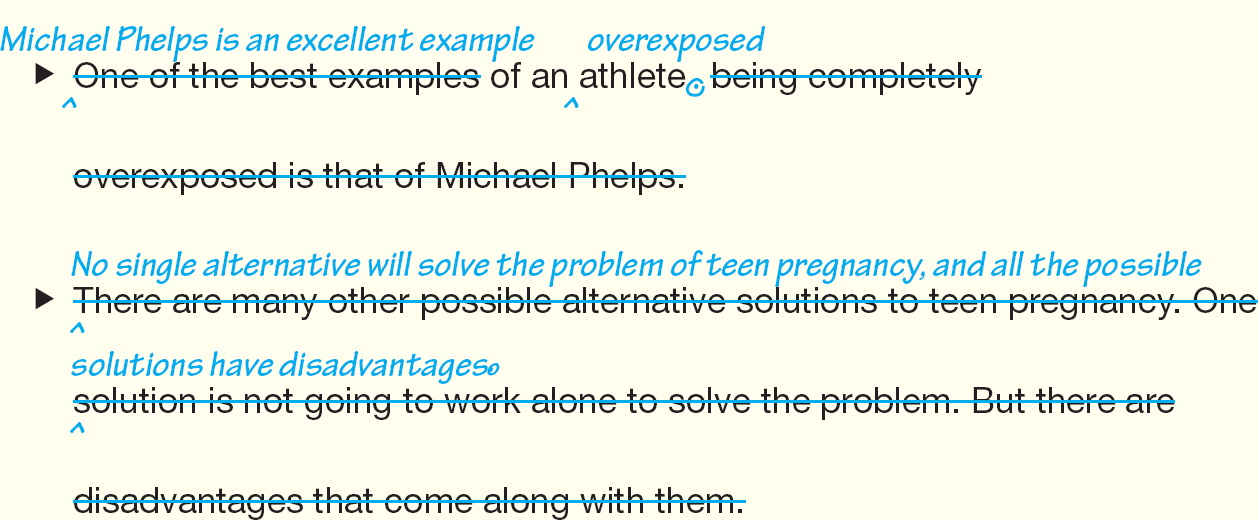W1 Concise Sentences
H-
Sentences with redundant phrasing, wordy expressions, and unnecessary intensifiers are tiresome to read and may be difficult to understand. Concentrate on choosing words well, simplifying sentence stucture, and avoiding words that are unnecessary or evasive.

Note: Even though you may need to add detail or examples to clarify your ideas, cutting out useless words will make your writing more focused.
W1-
Redundant phrasing adds unnecessary words to a sentence. Repetitive wording says the same thing twice.
Eliminate or rewrite redundant expressions.
The phrase blue in color is redundant because it repeats obvious information. Expressions such as past memories, advance planning, and mix together include modifiers that repeat information already provided in the word modified. Expressions such as the fact is true and in my opinion, I believe are redundant because they contain obvious implications.


Delete extra words from a redundant or repetitive sentence.

H-

W1-
Rewrite a wordy sentence to reduce the number of clauses and phrases.
Concentrate on turning clauses into phrases or replacing phrases, especially strings of prepositional phrases, with individual words. Sometimes you can even consolidate a series of sentences into one.

Eliminate wordy expressions.
Extra, empty words can creep into a sentence in many ways.

Here are examples of common wordy phrases and more concise alternatives.
| Wordy Phrases | More Concise Alternatives |
| due to the fact that | |
| in view of the fact that | |
| the reason for | |
| for the reason that | for, because, why, since |
| this is why | |
| in light of the fact that | |
| on the grounds that | |
| despite the fact that | although, though |
| regardless of the fact that | |
| as regards | |
| in reference to | concerning, about, regarding |
| concerning the matter of | |
| where . . . is concerned | |
| it is necessary that | |
| there is a need for | should, must |
| it is important that | |
| has the ability to | |
| is able to | can |
| is in a position to | |
| in order to | to |
| for the purpose of | |
| at this point in time | now |
| on the subject of | on, about |
| as a matter of fact | actually |
| be aware of the fact that | know [that] |
| to the effect that | that |
| the way in which | how |
| in the event that | if, when |
H-
Rewrite a wordy sentence to simplify its structure.
Often you can express your ideas more directly and forcefully by editing to eliminate there is or there are from the beginning of a sentence, or by changing from the passive to the active voice. (See also G5–d.)

Note: Whenever possible, replace am, are, is, was, and other forms of be with a stronger verb that clearly defines an action.
W1-
H-
Delete unnecessary intensifiers.
Although intensifiers such as very, really, clearly, quite, and of course can strengthen statements, eliminating them or substituting more forceful words is often more effective.
![]()
Some intensifiers are unnecessary because the words they modify are already as strong as possible, such as unique.

Eliminate unnecessary hedges.
Writers use hedges such as apparently, seem, perhaps, possibly, to a certain extent, tend, and somewhat to avoid making claims that they cannot substantiate. Hedges add subtlety to prose and acknowledge the possibility of important exceptions. Too many hedges, however, make writing too tentative.

W1-
If the word following a preposition is the object of a verb, the preposition may be unnecessary.
![]()
Another alternative is to change the verb.

FOR MULTILINGUAL WRITERS
Prepositions also combine with verbs to form two-